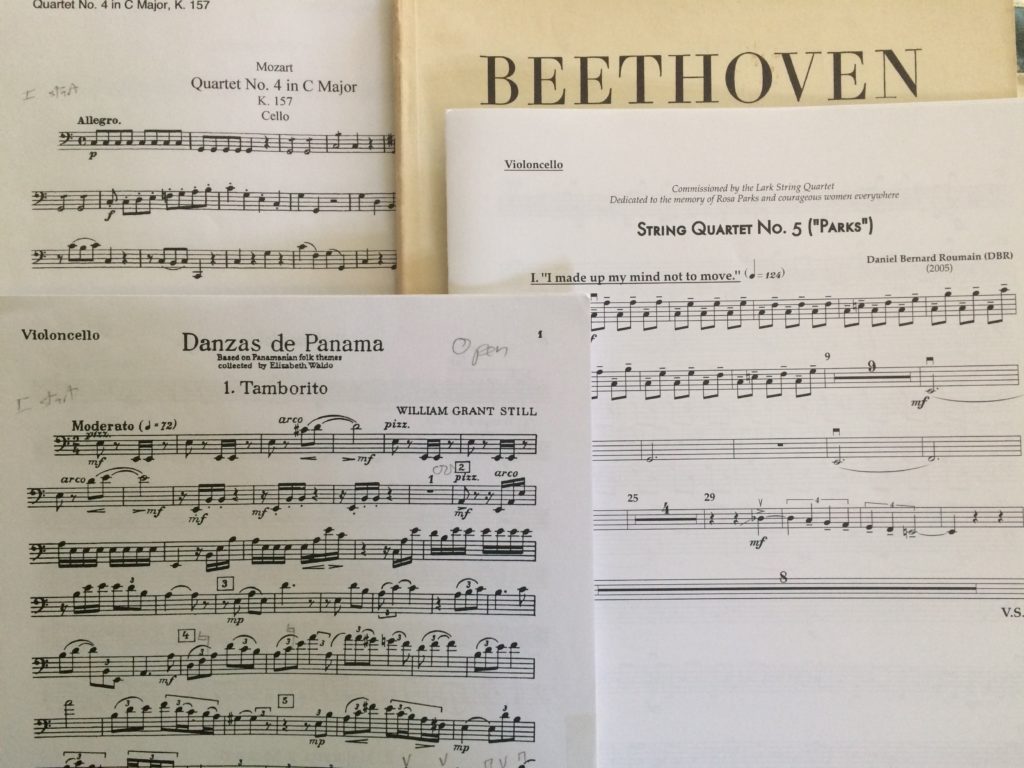LOCATION
Miami Beach Botanical Garden
2000 Convention Center Drive
33139 Miami Beach, FL
United States
See map: Google Maps
October 14, 2018, 6:00 pm to 7:30 pm
Concert Series: Music in Beautiful Spaces
Mozart String Quartet in C major, K. 157 (1772)
Beethoven String Quartet in C minor, Op. 18 No. 4 (1801)
Daniel Bernard Roumain Quartet No. 5 “Rosa Parks”: Klap Ur Handz (2005)
William Grant Still Danzas de Panama (1953)
Wolfgang A. Mozart (1756-1791) was a prolific and influential composer of the classical era. The six string quartets, K. 155–160, were composed by Wolfgang Amadeus Mozart in late 1772 and early 1773. Because they were composed in Milan while he was working on his opera Lucio Silla, they are popularly known as the Milanese Quartets.
Ludwig van Beethoven (1770-1827) was one of the greatest and most radical composers of all time. He was a tormented genius who went deaf in later life and never heard his final works. His 9 symphonies and 16 string quartets are possibly his greatest achievement, each one an unrivaled masterpiece, but he also wrote 5 piano concertos, piano sonatas and one opera, Fidelio. Beethoven composed his first six string quartets (Op. 18) between 1798 and 1800. They were published in 1801. The Opus 18 String Quartets are thought to demonstrate his total mastery of the classical string quartet as developed by Haydn and Mozart.
Daniel Bernard Roumain (born 1970) is a classically trained composer, performer, violinist, and band-leader noted for blending funk, rock, hip-hop and classical music into an energetic and experiential sonic form. DBR is of Haitian-American heritage and he attended Dillard Center for the Arts in Fort Lauderdale. He combines his classical music roots with a multicolored spectrum of contemporary black popular music. DBR’s exploration of musical rhythms and pulsing sounds is frequently peppered by cultural references. His dramatic pieces range from orchestral scores and energetic chamber works to rock songs and electronica. Each of the five string quartets is a musical portrait of an iconic figure from the Civil Rights Era. Collectively, they are CIVIL RIGHTS PORTRAITS. We will be performing the fifth, inspired by Rosa Parks.
William Grant Still (1895-1978) was an American composer, who composed more than 150 works, including five symphonies and eight operas. Often referred to as “the Dean” of African-American composers, Still was the first American composer to have an opera produced by the New York City Opera. Still is known most for his first symphony, which was until the 1950s the most widely performed symphony composed by an American. Born in Mississippi, he grew up in Little Rock, Arkansas, attended Wilberforce University and Oberlin Conservatory of Music, and was a student of George Whitefield Chadwick and later Edgard Varèse. Of note, Still was the first African American to conduct a major American symphony orchestra, the first to have a symphony (his 1st Symphony) performed by a leading orchestra, the first to have an opera performed by a major opera company, and the first to have an opera performed on national television. Due to his close association and collaboration with prominent Afro-American literary and cultural figures such as Alain Locke and Langston Hughes, William Grant Still is considered to be part of the Harlem Renaissance movement.

